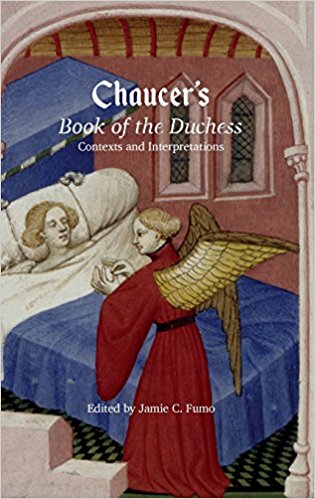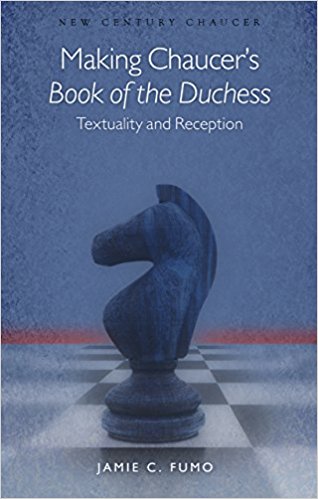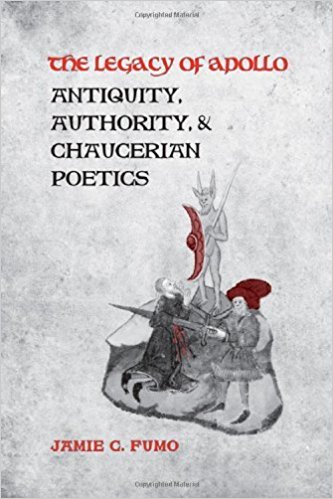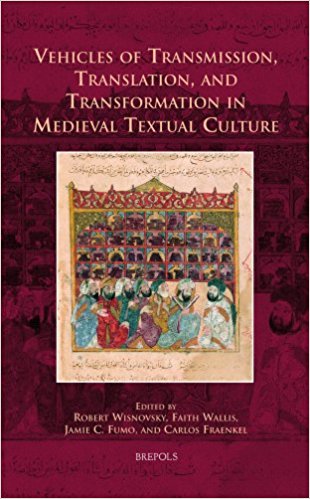Jamie C. Fumo

JAMIE C. FUMO, Professor, Ph.D. Princeton (2003), M.A. Princeton (2001), B.A. University of Massachusetts-Amherst (1998). Dr. Fumo specializes in medieval English literature and culture, particularly Chaucer and his contemporaries, with a subsidiary interest in classical reception. Her work engages the dynamic relationships between literary texts and traditions, medieval conceptions of authorship and authorial exchanges, and the operation of premodern textualities. She is fascinated by how early literary texts constitute and contemplate themselves, and how they talk back—and sometimes forward—to other texts.
Most recently, Dr. Fumo has completed two large-scale studies of Chaucer’s Book of the Duchess: a monograph that unfolds the story of the poem’s construction, reception, and interpretive history; and the first ever edited collection of essays on the poem, which gathers distinguished and emerging scholars to define new frontiers in research on this first major Chaucerian poem. She is currently at work on a new book project, Savory Work: The Poetics of Taste in Medieval England.
Books
- Chaucer’s Book of the Duchess: Contexts and Interpretations (ed.). Chaucer Studies XLV. Cambridge: D.S. Brewer, 2018.
- Making Chaucer's Book of the Duchess: Textuality and Reception. New Century Chaucer Series. Cardiff: University of Wales Press, 2015.
- Vehicles of Transmission, Translation, and Transformation in Medieval Textual Culture. Co-edited with Robert Wisnovsky, Faith Wallis, and Carlos Fraenkel. Turnhout: Brepols Press (Cursor Mundi 4), 2012.
- The Legacy of Apollo: Antiquity, Authority, and Chaucerian Poetics. Toronto: University of Toronto Press, 2010.
Selected Articles and Essays
- “Middle English Fredom," spec. issue on “Medieval Words for 2025,” Medieval Perspectives, ed. Britt Mize and Rebecca Kramer, vol. 38 (2024), 69-75.
- “All That Glitters: Chaucer’s Pardoner, Safrounen, and Culinary Deception,” Speculum 99.1 (2024): 39–73
- “Eating Well/Well Eaten: Lot’s Wife’s Folly and the Wisdom of Salt in Cleanness.” Exemplaria 35.2 (2023): 141-62.
- “Tastelessness: Lack and Loss of Savour in the Medieval Poetic Imagination.” In Literature and the Senses, ed. Annette Kern-Stähler and Elizabeth Robertson (Oxford UP, 2023), 289-301.
- “‘What me is’: Insomnia Cures, Saintly Miracles, and Chaucer’s Book of the Duchess as Illness Narrative,” Viator 52.2 (2021 [pub. 2022]), pp. 179-226.
- “As the Chess-Set Flies: Arthurian Marvels in Chaucer's Squire’s Tale and the Roman van Walewein.” In Medieval English and Dutch Literatures: The European Context, ed. Larissa Tracy and Geert H. M. Claassens (Cambridge: D. S. Brewer, 2022). Pp. 207-32.
- “Ovid: Artistic Identity and Intertextuality.” Oxford Handbook to Chaucer. Ed. Suzanne Conklin Akbari and James Simpson. Oxford: Oxford University Press, 2020. Pp. 219-37.
- “Criseida Lacrymosa? Rereading the Weeping Criseyde.” Chaucer Review 54.1 (2019): 35-66.
- “Exchange of Winnings or Mutual Beheading?: The Place of the Modern in Teaching the Medieval.” The Once and Future Classroom: Teaching the Middle Ages, 14.2 (TEAMS Consortium for Teaching the Middle Ages, online pub.), Spring 2018. https://once-and-future-classroom.org/exchange-of-winnings-or-mutual-beheading-the-place-of-the-modern-in-teaching-the-medieval/
- "Medieval Dog Whisperers: The Poetics of Rehabilitation." In Animal Languages in the Middle Ages: Representations of Interspecies Communication. Ed. Alison Langdon. Palgrave Macmillan, 2018. Pp. 217-34.
- "Ovid in the Middle Ages." In Oxford Bibliographies in Medieval Studies. Ed. Paul E. Szarmach. New York: Oxford University Press, March 30, 2017. Read article
- "The 'alderbeste yifte': Objects and the Poetics of Munificence in Chaucer's Book of the Duchess." Exemplaria 28.4 (2016): 277-96.
- "Ancient Chaucer: Temporalities of Fame." Chaucer and Fame: Reputation and Reception, ed. Isabel Davis and Catherine Nall. Cambridge: Boydell and Brewer, 2015. Pp. 201-20.
- "Commentary and Collaboration in the Medieval Allegorical Tradition." A Handbook to the Reception of Ovid, ed. John F. Miller and Carole E. Newlands. Chichester, West Sussex: Wiley-Blackwell, 2014. Pp. 114-28.
- "The Pestilential Gaze: From Epidemiology to Erotomania in the Knight's Tale." Studies in the Age of Chaucer 35 (2013): 85-136.
- "Ovid's New Clothes: Text and Image in Caxton's 'Booke of Ouyde' (1480) and Contemporary Prose Moralizations of the Metamorphoses." Vehicles of Transmission, Translation, and Transformation in Medieval Textual Culture. Ed. Robert Wisnovsky, Faith Wallis, Jamie C. Fumo, and Carlos Fraenkel. Turnhout: Brepols Press (Cursor Mundi 4), 2012. Pp. 313-33.
- "Hating Criseyde: Last Words on a Heroine from Chaucer to Henryson." Chaucer Review 46.1/2 (2011): 20-38.
- "The Ends of Love: (Meta)physical Desire in Chaucer's Troilus and Criseyde." Sacred and Profane in Chaucer and Late Middle English Literature: Essays in Honour of John V. Fleming. Ed. Robert Epstein and William Robins. Toronto: University of Toronto Press, 2010. Pp. 68-90.
- "The Consolations of Philosophy: Later Medieval Elegy." The Oxford Handbook of the Elegy. Ed. Karen Weisman. Oxford: Oxford University Press, 2010. Pp. 118-34.
- "Romancing the Rose: Apuleius, Guillaume de Lorris, and Moral Horticulture." Modern Philology 107.3 (2010): 343-79.
- "Metamorphoses Metamorphosed: Teaching the Ovidian Tradition." Approaches to Teaching the Works of Ovid and the Ovidian Tradition. Ed. Barbara Weiden Boyd and Cora Fox. New York: Modern Language Association, 2010. Pp. 212-18.
- "John Metham's 'straunge style': Amoryus and Cleopes as Chaucerian Fragment." Chaucer Review 43.2 (2008): 215-37.
- "Argus' Eyes, Midas' Ears, and the Wife of Bath as Storyteller." Metamorphosis: The Changing Face of Ovid in Medieval and Early Modern Europe. Ed. Alison Keith and Stephen Rupp. Toronto: Centre for Renaissance and Reformation Studies, 2007. Pp. 129-50.
- "Chaucer as Vates?: Reading Ovid through Dante in the House of Fame, Book 3." Writers Reading Writers: Intertextual Studies in Medieval and Early Modern Literature in Honor of Robert Hollander. Ed. Janet Levarie Smarr. Newark: University of Delaware Press, 2007. Pp. 89-108.
- "Books of the Duchess: Eleanor Cobham, Henryson's Cresseid, and the Politics of Complaint." Viator 37 (2006): 447-77.
- "The God of Love and Love of God: Palinodic Exchange in The Prologue of the Legend of Good Women and the 'Retraction.'" The Legend of Good Women: Context and Reception. Ed. Carolyn Collette. Cambridge: D. S. Brewer, 2006. Pp. 157-75.
- "Aurelius' Prayer, Franklin's Tale 1031-79: Sources and Analogues." Neophilologus 88 (2004): 623-35.
- "Thinking Upon the Crow: The Manciple's Tale and Ovidian Mythography." Chaucer Review 38.4 (2004): 355-75.
- "'Little Troilus': Heroides 5 and Its Ovidian Contexts in Chaucer's Troilus and Criseyde." Studies in Philology 100.3 (2003): 278-314.
- "An Interpretive Crux in Januarie's Garden: Chaucer's Merchant's Tale and the Crucifixion." Mediaevalia 23 (2002): 1-37.
SELECTED AWARDS
- Committee on Faculty Research Support Award, FSU, 2016
- Programme d'établissement de nouveaux professeurs-chercheurs, FQRSC (Quebec) 2008-11
- Co-applicant, Équipe en functionnement grant, FQRSC (Quebec) 2008-12
- Co-applicant, Équipe en émergence grant, FQRSC (Quebec) 2006-08
- Virginia Brown Postdoctoral Fellowship in Paleography, Center for Epigraphical and Palaeographical Studies, Ohio State University, 2004
- Harold W. Dodds Honorific Fellowship, Princeton University, 2002-03
- Andrew W. Mellon Fellowship in Humanistic Studies, 1998-99




